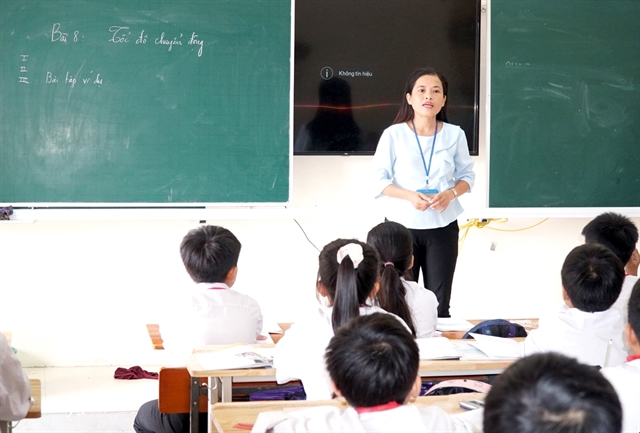 Society
Society

 |
| A Natural Sciences class at Nghi Thu Secondary School in the central province of Nghệ An. — VNA/VNS Photo |
NGHỆ AN — As the 2018 general education curriculum is being rolled out at the secondary school level, finding qualified teachers for integrated subjects remains a major bottleneck that schools are struggling to address.
According to the new curriculum, the subjects of Biology, Physics and Chemistry are grouped into one called Natural Sciences, while History and Geography are also combined in another integrated subject.
Although having earned a Bachelor’s degree in Biology, Nghi Phương Secondary School’s teacher Nguyễn Thị Minh will have to be in charge of Natural Sciences and Computer Sciences this year due to a lack of human resources.
Minh said that students are not yet used to studying Natural Sciences as an integrated subject, and there are few reference documents for support teachers with lesson design.
Nguyễn Công Sơn, principal of Nghi Phương Secondary School in Nghi Lộc District of Nghệ An, added that the school has witnessed a shortage of teachers for years, which affects lesson arrangement and allocation.
Challenges in designing tests have also been reported as the model of integrated subjects is applied.
In Cửa Lò Town’s Nghi Thu Secondary School, teachers made multiple attempts at test design in the three years of implementing the new curriculum, but still have not found a satisfactory option.
School principal Trần Thị Thúy Thanh said: “In our first try, we designed a test that integrated all three subjects, but found that it difficult in the grading process.
“Meanwhile in the second attempt with tests arranged according to each specific subject, we had trouble determining the final grades for students.”
The school then tried to design tests in multiple-choice format to address these problems.
“However, in this way, teachers could not accurately assess their students’ ability,” said Thanh.
“A teacher could grade all three subjects without understanding the students’ quality of work,” she added.
Grade 8 is also when students start joining training teams for academic competitions at their localities.
Schools are still in the process of coming up with clear guidelines for these students, as studying based on the integrated teaching model means they have to juggle two to three smaller subjects at the same time.
Meanwhile, having these subjects separated would mean straying away from the principle of the reformed curriculum.
In the previous academic year review conference with the Ministry of Education and Training (MoET) in August, educators raised their voices on the issue and hoped that the MoET would take into account concerns at the grassroots level and address the situation.
In the meantime, educational institutions in Nghệ An Province have been taking their own actions to alleviate the issues at hand.
For the 2023-2024 school year, the provincial education and training department has allowed schools to proactively assign teachers based on their capacity and flexibly design their lesson plans and schedules.
Department head Thái Văn Thành said that the province continues to open teaching positions according to the registered quota, and organise short training courses on the integrated subject of Natural Sciences, as well as on Computer Sciences, Technology and Foreign Languages.
Nghệ An also plans to work with educational institutions to train teachers for subjects that are witnessing a shortage of human resources and enlarge the talent pool for recruitment.
Localities across the country have been accelerating the assessment of teaching quality according to the 2018 general education curriculum. VNS




